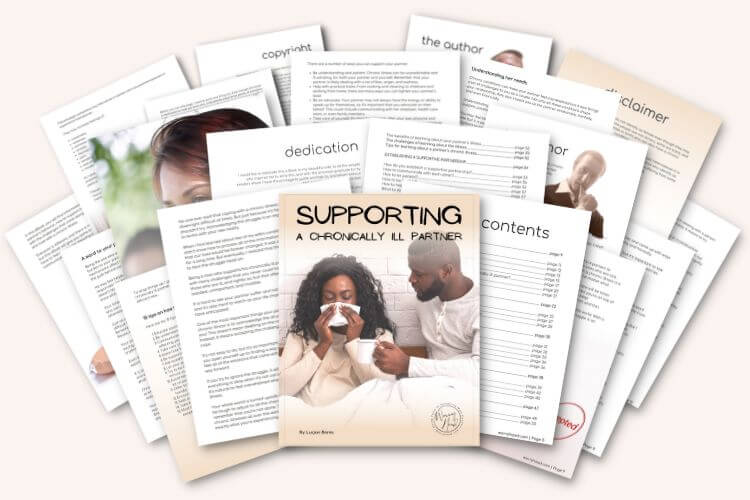What can you do if your wife is long-term ill?
If your wife has a long-term illness, you may feel helpless, but there are a number of things you can do to support her and help her through her illness. To name a few here’s what you can do if your wife is long-term ill:
Be there for her, help out, help her relax, be patient and understanding, listen to her when she wants to talk, give her space when she needs it, talk about her feelings, spend quality time with her, provide financial support, and be a positive influence in her life.
What can you do if your wife is long-term ill?
When your wife has a long-term illness, your role as a husband changes. You may feel helpless, hopeless, lost, and even lonely and misdirected. Your world revolves around her now and your needs often come second.
It’s difficult to see the woman you love go through something so life-changing, but there are ways you can support her.
First and foremost, you need to communicate because in any healthy relationship communication can be difficult, but it is even more so when one person is sick. You need to talk about her feelings, your feelings, and the changes that are happening. You both need to be on the same page.
Just being there for her is important. When she’s having a bad day, be there to listen or just sit with her in silence.
Helping out around the house is crucial. If she’s too exhausted to do things that need to be done, you need to step in and help.
You should also try to help her relax when possible. Take on some of her stressors, whether that means dealing with the kids or taking care of household chores.
It’s important to be patient and understanding. This isn’t easy for either of you, so cut each other some slack. Listen to her when she needs it but also talk about your own feelings. Be there for her emotionally and physically.
And finally, be a positive influence in her life. She needs all the support she can get, so try to be a source of strength for her.
If you want more in-depth information about how to support your partner with her chronic conditions and how to cope with the new normal in your relationship, I wrote a “Supporting a Chronically Ill Partner” e-Book.
You can get the 1st Chapter of the e-Book for FREE, and if you like it, you’ll get a Whopping 33% Discount on the Whole Book, plus discounts on other helpful tools. You have nothing to lose but a lot to gain!
The first chapter alone contains a lot of information for both of you about acknowledging the struggles, including:
- A word to your partner.
- A word to you.
- Stepping on eggshells.
- Understanding her needs.
- How to acknowledge having a chronically ill partner?
- Acknowledging can be hard.
- 15 tips on how to do it!
Get the 1st Chapter FREE!
Chronic Illness for Partners

How can you cope emotionally?
Having a long-term illness present in your marriage is a lot to process emotionally. There will be issues, and as they arise, you will have to face them.
You may feel like you’re walking on eggshells around your wife. You don’t want to upset her, so you avoid certain topics. This can lead to tension and resentment, so it’s important that you talk about your feelings.
You also need to take care of yourself. This is a difficult time for you too, and you can’t be there for your wife if you’re not taking care of your own needs. Make sure to schedule some “me” time, whether that means going for a cold one with mates or taking a solo trip to the movies.
It’s also essential that you find a support system, whether that be friends, family, or a therapist. It is a lot to process, and accepting the “new normal” might be more difficult than you may think.
To cope emotionally, you need to be honest with yourself and your wife, take care of yourself and find a supportive network.
What can you do practically?
Depending on the severity of the illness, there may be things you have to do on a daily basis to help your wife.
This could include things like helping her to shower, getting her dressed, or cooking meals. But if your wife is independent like mine, she may just need help with things like grocery shopping or vacuuming the house.
If her illness is severe, you may have to take on the role of primary caregiver. This means you will have to juggle work, family, and home life.
But apart from having to take on additional responsibilities around the house, it’s important that you talk about this with your wife so that she doesn’t feel like she’s a burden.
If your wife’s long-term illness is severe, she may need round-the-clock care. In this case, you may need to hire a professional caregiver.

What can you do to keep your relationship strong?
When my wife was first diagnosed, I was in complete shock. I didn’t know how to react or what to do. I felt like I was losing her, and I was terrified. Thankfully, we were able to get through that tough time together and come out stronger than ever.
If you’re facing a similar situation, here are a few things that may help you. Here are 27 things you can do if your wife is long-term ill:
- Be there for her emotionally.
- Help out with household chores and errands.
- Provide financial support.
- Be patient and understanding.
- Encourage her to see her doctor regularly.
- Help her to stick to her treatment plan.
- Keep in touch with her friends and family members.
- Offer to take care of the children while she rests.
- Make sure she is eating healthy meals and getting enough exercise.
- Help her to find ways to relax and de-stress.
- Be a positive influence in her life.
- Encourage her to stay involved in activities she enjoys.
- Talk to her about her feelings.
- Listen to her when she wants to talk.
- Give her space when she needs it.
- Hold her when she is sad or scared.
- Cry with her when she is grieving.
- Laugh with her when she is happy.
- Share your own feelings with her.
- Help her to find new hobbies and interests.
- Spend quality time with her doing things she enjoys.
- Go on outings with her and make new memories together.
- Reminisce about happy times together in the past.
- Send her cards, letters, and flowers to let her know you are thinking of her.
- Pray for her and ask others to do the same.
- Make sure she has all the information and resources she needs.
- Be there for her, no matter what.
If your wife is long-term ill, show her your love and support by doing these things. But don’t forget to take care of yourself, too. It’s important that you find a way to cope with your own emotions and stressors so that you can be strong for your wife.
Don’t be afraid to ask for help when you need it. Otherwise, you will get caregiver burnout, or like in my case, experience compassion fatigue.
Long-term illness and divorce…
When your wife has a long-term illness, the long-term illness divorce rate is as high as 75 percent! But this doesn’t mean that you and your wife will get divorced if she becomes ill.
My wife suffers from endometriosis and fibromyalgia. For both, there’s a high endometriosis divorce rate and a high fibromyalgia divorce rate. More so, if the woman is ill because their men don’t understand what it’s like to be in chronic pain every day.
But we’ve been together for almost 10 years now, and our relationship is stronger than ever, and thankfully, we were able to overcome the obstacles that our illnesses brought us, and we are better for it.
If you’re facing a long-term illness in your marriage, it’s important to talk about your feelings with your wife. If you’re feeling overwhelmed, tell her. And if you need help, don’t be afraid to ask for it.
It’s also important to make sure that you’re taking care of yourself emotionally and physically. If you’re not taking care of yourself, you won’t be able to take care of your wife.
If you’re struggling to cope with your wife’s long-term illness, please seek professional help. There are counselors and therapists who specialize in helping couples deal with chronic illnesses.
Final words on your wife’s long-term illness.
No one knows what the future holds, but if your wife is long-term ill, know that you’re not alone. There are millions of other husbands out there who are in the same boat as you.
You can find support and resources by reaching out to organizations like the National Caregivers Association or the American Chronic Pain Association.
Remember that it is important to be understanding and patient. Your wife is likely going through a lot of emotions and may need some extra time and space. Try to be as supportive as possible.
Help with chores around the house such as taking care of childcare duties, and make sure she has whatever she needs. Finally, keep communication open. Talk about how she is feeling, offer words of encouragement, and let her know that you are there for her.
Get the 1st Chapter FREE!
Chronic Illness for Partners



About Me
Hi, I’m Lucjan! The reason why I decided to create this blog was my beautiful wife, who experienced a lot of pain in life, but also the lack of information about endometriosis and fibromyalgia for men…
